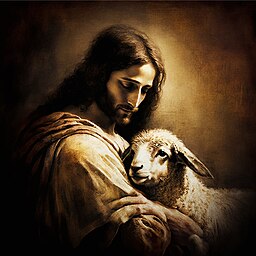Click for French Translation/Traduction en français
How can I be in the world but not of the world?
John 17 records the great Intercessory Prayer of Jesus. Parts of this prayer have been truncated to create the oft-repeated modern Christian phrase, “We should be in the world, not of the world.”
6 I have manifested thy name unto the men which thou gavest me aout of the world: thine they were, and thou gavest them me; and they have kept thy word…
11 And now I am no more in the world, but these are in the aworld, and I come to thee. Holy Father, keep through thine own name those whom thou hast given me, that they may be bone, as we are.
12 While I was with them in the world, I kept them in thy name: those that thou gavest me I have kept, and anone of them is blost, but the son of cperdition; that the scripture might be fulfilled.
13 And now come I to thee; and these things I speak in the world, that they might have my ajoy fulfilled in themselves.
14 I have given them thy word; and the world hath hated them, because they are not of the world, even as I am not of the world.
15 I pray not that thou shouldest take them out of the aworld, but that thou shouldest bkeep them from the cevil.
16 They are not of the aworld, even as I am not of the world.
John 17:6, 11-16

INTRODUCE THE DOCTRINE
1. “We should be in the world but not of the world.” The lesson “How can I be in the world but not of the world?” suggests asking the young women if they’ve ever heard this phrase and what it means to them. Because I’ve heard this phrase used so often in non-constructive ways at church, I would take the time to define and discuss specific words in it (below) before asking the young women their perspective on the entire phrase. By getting their input on individual words, I would try to build a class definition in a concrete, constructive way.
2. The lesson also suggests showing “Dare to Stand Alone,” the video of a story by Thomas S. Monson. The story itself is nice (President Monson standing alone as a Mormon in the Navy and then realizing he wasn’t alone). But I personally wouldn’t show the video — partly to avoid starting the lesson with the possible message that Mormons are the only good people in the world, and mostly to avoid the vignette of the teenage girl looking disdainfully at friends who suggest she wear a sleeveless dress, which I feel could derail the deeper possibilities in this lesson.
LEARN TOGETHER
“We should be in the world, but not of the world.” Throughout my years in the church, I’ve heard this phrase so many times. Discussing it at church is challenging for me because most (but not all) class discussions about it tend toward the antagonistic, the self-righteous, or the vague.
I would take the time needed to clarify what I personally see in the phrase, as well as invite the young women’s input and insight.
Defining In & Of
- In: reference to a place where you are located
- Of: indicating origin, source, also denotes ownership or composition; expressing the relationship between the part and the whole.
In is pretty clear. It’s a location, as in: We are in this world.
But of is a little less obvious at first glance. How do you not be “of” the world? The word’s main definitions express origin or permanently belonging to in some way: “the daughter of Sister and Brother _____.” “the plays of Shakespeare,” or “the sleeve of her dress. . .”
For me, not being of this world expresses the idea that my identity did not originate here and that it doesn’t end here. The call to not be of the world invites a wider vision of life and clearer perspective on challenges we experience here. In other words, this isn’t all there is. I would ask the young women to share further thoughts on what these words mean to them.
Defining “the world”
I’ve heard “the world” used as a sort of vague shorthand, often to refer to people who are not “us” — in other words, people who aren’t baptized Latter-Day Saints who attend church, people who drink or smoke.
By many definitions I’ve heard, my in-laws technically qualify as “the world.” They drink. They swear. They go to the store on Sunday.
And they are some of the most generous, loyal, trustworthy people I know.
I cringe when I hear the sentiment that we (at church) are not of the world, and those people out there are (poor them) — aren’t we great? I am wary of that us/them mentality and would work to avoid or correct it if it came up in my class.
I would have someone read this scripture:
For God so loved the world, that he gave his only begotten Son, that whosoever believeth in him should not perish, but have everlasting life. (John 3:16)
As we discuss our class definition of “the world,” I would invite the young women to speak in terms of behaviors, enviornments, of their own personal experiences, not in terms of other people, who are children of a God who loves them too.
We must cherish one another, watch over one another, comfort one another and gain instruction, that we may all sit down in heaven together. — (Lucy Mack Smith)
It is my experience that there are a lot of very fine people in the world. Just because they do not have my outlook on life has never given me reason to alienate them through prudish self-righteousness. Perhaps herein lies the secret of ‘living in the world without being a part of the world. — (De Witt J. Paul Improvement Era, Sept. 1965)
So what is the definition of the world? You can find many varied definitions in the scriptures and among church leaders. Here are just a few:
- Midst of wickedness, which is spiritual Babylon (D&C 133:14)
- Spirit of alienation from the Saints of God (David O. McKay)
- The pride of life (1 John 2:15-17)
- Errors of philosophy and errors of doctrine, errors in regard to government, or whatever those errors may be. . . darkness and sin contrary to the will of the Lord (Joseph Fielding Smith)
My own definition of the world: environments that distract or block me from my higher purpose; experiences or spaces that feel dark and that limit my connection to God; the opposite of Zion, which is the pure in heart (D&C 97:21).
I would invite the young women’s input. How, specifically, can we define “the world” so we know exactly what it is we should be in but not of?
One way to be in but not of: Repentance
I think that “in the world” lessons run the risk of sending students home feeling self-satisfied after talking about other people’s sins and shortcomings (phrased as the world’s sins). I would encourage the young women to focus on what they want to improve in their own lives. Repentance is a change of heart — to become more pure in heart, to act in a way that’s congruous with belief.
One activity suggested in the lesson is to invite young women to select a Personal Progress value, study it, and share with the class. After they share their own choice, I might draw their attention to a particular activity in Integrity:
Look up the word integrity in a dictionary. Interview your mother, grandmother, or another woman you respect about her understanding and application of the word. Make a list of the ways you can make your actions consistent with your knowledge of right and wrong, and record in your journal what it means to you to have integrity.
I would emphasize that being in the world but not of it does not mean never making mistakes. We are residing in a fallen place, in a fallen state.
We must have the courage to be imperfect while striving for perfection. — (Patricia T. Holland, “One Thing Needful: Becoming Women of greater Faith in Christ, Ensign, Oct 1987)
Repentance is an opportunity to line up our lives with our greater potential.
Another way to be in but not of: Love
This month’s lessons are all centered around commandments. The scriptures tell us Christ’s answer when asked which commandment was most important:
Master, which is the great commandment in the law? Jesus said unto him, Thou shalt love the Lord thy God with all thy heart, and with all thy soul, and with all thy mind. This is the first and great commandment. And the second is like unto it, Thou shalt love thy neighbor as thyself. On these two commandments hang all the law and the prophets. (Matthew 22: 26-30)
All the other commandments that we keep are contingent upon those first and greatest commandments. Christ loved when he was here and that’s what we are asked to do now.
I would ask the young women what it looks like to express Christlike love while living in the world but not of it. (Which is maybe a trick question? Expressing true Christlike love is likely the only real way to do it.)
A matter of focus
Being in the world but not of it, seems (to me) a matter of focus. Do we get engrossed and bogged down by the worries and pitfalls of a fallen world? Or do we regularly connect to our Heavenly Parents and keep perspective of the higher potential they see in us, both in this life and the next?
Love not the world, neither the things that are in this world. If any man love the world, the love of the Father is not in him . . . And the world passeth away, and the lust thereof: but he that doeth the will of God abideth forever. (1 John 2: 15, 16)
As daughters of Heavenly Parents, we are eternal. When we lose sight of that perspective, the world we live in can feel very dark. I would share this with the young women near the end of the lesson.
Sisters, strengthen yourselves by seeking the source of true strength — the Savior. Come unto him. He loves you. He desires your happiness and exults in your desires for righteousness. Make him your strength, your daily companion, your rod and your staff. Let him comfort you. There is no burden we need bear alone. His grace compensates for our deficiencies. Your strength will strengthen others — your children, your husband, your friends, and your sisters in the gospel. That strength will flow back from them to you when you need it. — (Chieko N. Okazaki, “Strength in the Savior,” Ensign Nov. 1993)
In my own youth experience, I heard a lot of fear surrounding the phrase the world. I think it’s useful to communicate confidence in our young women’s abilities to make wise choices. We can all best live in the world (but not of it) with perfect love, which casteth out all fear.
This lesson plan adapted from a lesson plan originally written in 2014 to accompany the Young Women Lesson: How can I be in the world but not of the world?
Leçon des Jeunes Filles : Comment puis-je être dans le monde mais pas du monde?
PRESENTER LA DOCTRINE
1. “Nous devrions être dans le monde mais pas du monde.” La leçon suggère de demander aux jeunes filles si elles ont déjà entendu cette phrase et ce qu’elle signifie. Comme j’ai déjà entendu cette phrase employée de manière non constructive à l’Eglise, je prendrais le temps de définir et de discuter de certains mot (ci-dessous) avant de poser cette question aux jeunes filles. En analysant chaque mot, j’essaierais de créer une définition ensemble d’une manière concrète et constructive.
2. La leçon suggère aussi de montrer la vidéo “Ne craignez pas d’être seul,” une histoire de Président Monson qui travaillait en tant que mormon dans la marine militaire. Personnellement, je ne la montrerais pas la vidéo, non seulement pour éviter de commencer la leçon avec le message que les mormons sont les seules personnes de qualité dans le monde, mais aussi pour éviter la scène où une adolescente regarde avec dédain ses amies qui suggèrent qu’elle porte une robe sans manche, ce qui pourrait distraire des messages plus profondes de la leçon.
APPRENDRE ENSEMBLE
“Nous devrions être dans le monde, mais pas du monde.” Pendant les années que j’ai passées dans l’Eglise, j’ai entendu cette phrase mille fois. Les discussions à l’Eglise à ce sujet sont difficiles pour moi car la plupart des discussions a tendance à devenir antagoniste, hypocrite moralisatrice ou vague.
Je prendrais le temps de clarifier cette phrase et ainsi inviter les idées des jeunes filles.
Définir “Dans” et “Du”
- Dans : référence à un endroit où on se trouve In:
- Du : indique l’origine, la source, indique la composition ou la propriété; exprime aussi la relation entre une part et l’ensemble.
Dans est relativement clair. C’est un endroit : nous sommes dans ce monde.
Mais du est moins évident à première vue. Comment ne pas être du monde ?
Pour moi, ne pas être du monde exprime l’idée que mon identité n’a pas son origine ici, ne termine pas non plus ici. L’appel de ne pas être du monde invite à une vision plus grande de la vie et une perspective plus Claire des difficultés que nous rencontrons ici. Je demanderais aux jeunes filles de partager leurs pensées sur ce qui ces mots signifient pour elles.
Définir “le monde”
J’ai souvent entendu “le monde” employé comme une abréviation vague pour parler des personnes qui ne sont pas “nous,” c’est-à-dire, ceux qui ne sont pas baptisés membres de l’Eglise qui viennent le dimanche, ceux qui boivent et qui fument.
Selon ces définitions, mes beaux-parents qualifient comme “le monde.” Ils boivent de l’alcool. Ils disent de gros mots. Ils font leurs courses le dimanche.
Et ce sont parmi les personnes les plus généreux, loyaux et dignes de confiance de ma connaissance.
Je grimace quand j’entends dire que nous (à l’Eglise) ne sont pas du monde, et les gens en dehors (les pauvres) le sont—n’est-ce pas merveilleux? Je me méfie de cette mentalité de nous/eux et j’essaierais de corriger ou éviter cette mentalité dans ma classe.
Je ferais lire cette Ecriture :
Car Dieu a tant aimé le monde qu’il a donné son Fils unique, afin que quiconque croit en lui ne périsse point, mais qu’il ait la vie éternelle. (Jean 3:16)
Pendant la discussion, j’inviterai les jeunes filles à parler du monde en termes de comportement, d’environnement et des expériences personnelles et non pas en termes de personnes, qui sont aussi enfants d’un Dieu aimant.
“Nous devons nous chérir les uns les autres, veiller sur les uns et les autres, réconforter les uns les autres et apprendre ensemble, afin que nous puissions nous asseoir ensemble dans les cieux.”— (Lucy Mack Smith)
C’est mon expérience qu’il y a beaucoup de personnes de qualité dans le monde. Le fait qu’il ne partagent pas ma vision de la vie ne me donne jamais le droit de les éloigner avec une hypocrisie moralisatrice. C’est peut-être cela le secret de vivre dans le monde sans en faire partie. — (De Witt J. Paul Improvement Era, Sept. 1965)
Alors quelle est la définition du « monde » ? Il y en a plusieurs dans les Ecritures et dans les déclarations des dirigeants de l’Eglise :
- « Au milieu de la méchanceté, qui est la Babylone spirituelle » (D&C 133:14)
- L’esprit d’aliénation des Saints de Dieu (David O. McKay)
- L’orgueil de la vie (1 John 2:15-17)
- Les erreurs de philosophie et les erreurs de doctrine, des erreurs en ce qui concerne le gouvernement…les ténèbres et le péché au contraire de la volonté du Seigneur. (Joseph Fielding Smith)
Ma propre définition du “monde” : des environnements qui me distraient ou qui me bloquent de mon but supérieur; des expériences ou des espaces qui sont obscures et qui limitent ma relation avec Dieu; l’opposé de Sion, qui est ceux qui ont le cœur pur (D&C 97:21).
J’inviterais les avis des jeunes filles. Comment pouvons-nous définir « le monde » pour que nous sachions exactement ce qu’il faut éviter ?
Une façon d’être dans mais pas du monde : le repentir
Je pense que ces leçons sur “le monde” courent la risqué de renvoyer les élèves chez eux avec les sentiment de satisfaction après avoir parlé des péchés des autres (les péchés du monde). J’encouragerais les jeunes filles à penser plutôt à ce qu’elle veulent améliorer dans leur propre vie. Le repentir est un changement de cœur, de développer un cœur plus pur.
Une activité suggérée dans la leçon est inviter les jeunes filles à choisir un idéal du Progrès Personnel, l’étudier et le partager avec la classe. J’attirerais ensuite leur attention à une activité pour l’idéal l’Intégrité :
« Cherche le mot intégrité dans un dictionnaire. Demande à ta mère, ta grand-mère ou une autre femme que tu respectes comment elle comprend et applique ce mot. Fais la liste des façons dont tu peux mettre tes actions en accord avec ta connaissance du bien et du mal, et Note dans ton journal ce que signifie pour toi être intègre. »
Je mettrai l’accent sur le fait que vivre dans mais pas du monde ne veut pas dire ne jamais faire d’erreurs. Nous vivons dans un monde déchu, dans un état déchu.
“Nous devons avoir le courage d’être imparfait en cherchant la perfection.”— (Patricia T. Holland, “One Thing Needful: Becoming Women of greater Faith in Christ, Ensign, Oct 1987)
Le repentir est une occasion d’aligner notre vie avec notre plus grand potentiel.
Une autre façon d’être dans mais pas du monde : l’amour
Le leçons de ce mois-ci sont toutes centrées sur les commandements. Les Ecritures nous donne la réponse du Christ quand on lui a demandé quel commandement était le plus important :
« Maître, quel est le plus grand commandement de la loi? Jésus lui répondit: Tu aimeras le Seigneur, ton Dieu, de tout ton cœur, de toute ton âme, et de toute ta pensée. C’est le premier et le plus grand commandement. Et voici le second, qui lui est semblable: Tu aimeras ton prochain comme toi-même. De ces deux commandements dépendent toute la loi et les prophètes. » (Matthew 22: 26-30)
Le Christ a aimé quand il était sur la Terre et c’est ce qu’il nous demande de faire maintenant.
Je demanderais aux jeunes filles comment elle peuvent exprimer l’amour du Christ en vivant dans le monde mais pas du monde.
Une question de concentration
Etre dans le monde mais pas du monde me semble être une question de concentration. Sommes-nous facilement accablés par les soucis d’un monde déchu? Ou bien sommes-nous souvent en communication à nos Parents Célestes et gardons-nous une perspective du potentiel supérieur qu’ils voient en nous??
“N’aimez point le monde, ni les choses qui sont dans le monde. Si quelqu’un aime le monde, l’amour du Père n’est point en lui…Et le monde passe, et sa convoitise aussi; mais celui qui fait la volonté de Dieu demeure éternellement. » (1 Jean 2: 15, 17)
En tant que filles de nos Parents Céleste, nous sommes éternelles. Quand nous perdons cette perspective, le monde dans lequel nous vivons peut sembler très sombre. Je partagerais cette citation vers la fin de la leçon :
Sisters, strengthen yourselves by seeking the source of true strength — the Savior. Come unto him. He loves you. He desires your happiness and exults in your desires for righteousness. Make him your strength, your daily companion, your rod and your staff.
« Laissez-le vous consoler. Il n’est pas de fardeau que nous devions porter toutes seules. Sa grâce compense nos déficiences. Votre force en fortifiera d’autres: vos enfants, votre mari, vos amis et vos sœurs dans l’Evangile. Cette force, ils vous la redonneront à leur tour quand vous en aurez besoin. » — (Chieko N. Okazaki, “Strength in the Savior,” Ensign Nov. 1993)
Je pense que c’est utile de communiquer de la confiance dans les capacité de nos jeunes filles à faire de bons choix. Nous pouvons tous vivre mieux dans le monde (mais pas du monde) avec un amour parfait, qui bannit la crainte.







19 Responses
Thank you, dear Kathy. This seems to be a lesson that can especially benefit from a thoughtful interpretation, and you brought one, perfectly. Reading it was the most spiritually filled I have felt in a long time. Thank you, again.
I remember a dear friend of mine telling me once that it hurt her when some church leaders set us against the world, because everything she has ever known or loved is in the world, and because she loves the world-our home, Mother earth(!), as well as the people in it.
For other types of the specific examples that Em might be talking of above, are things like poor media. Here too, Latter-day Saints are not the only ones to recognize the dangers. I have loved reading a variety of articles acknowledging that the way some media portrays women to be evil (with unrealistic photoshopping,etc.), and to see all of the people and groups who are fighting back.
Thank you, Rachel! That means a lot to me to hear that this felt spiritually filling for you. It was a spiritually filling experience for me to put it together—one that I needed.
And I identify with your friend’s experience. I feel dismayed when “the world” is used as a blanket term to dismiss anything/everything that’s not church. I’d feel much more comfortable if we emphasized our search for anything lovely, of good report, or praiseworthy, regardless of where it might be found. There’s so much of it to find!
It ended up being even more helpful. My RS teacher compared our view of marriage with the world’s view. I know that there is divorce, but I also know that we are not the only ones who value marriage and families. It was so good to have your kind words in my heart and mind.
[…] Smith manual’s lesson, Chapter 19. Fortunately, this topic is also well-covered in an exceptional lesson guide we recently did for Young Women’s. Definitely check it out! (As per usual, my questions to […]
This is perfect. Thank you.
Thanks for your kind words, Sonja.
Thank you so much for sharing your thoughts. I’ve been thinking about this lesson all week, but it just wasn’t coming together in a way I felt comfortable with. Your interpretation is what I needed. Now I am excited to discuss this idea with my girls. Thank you!
Glad to know this could be helpful for you, Kelsey. I hope the discussion with your girls went well.
Thank you so much for such a spiritual, refreshing insights on this topic. Written perectly.
Thanks for sharing, Lindsey. Glad to hear these thoughts were helpful for you.
Thank you for sharing! Perfect interpretation of the phrase and support from scriptures.
This is wonderfully interpreted and so in line with my heart. Thank you for articulating it in such a beautiful way! Excited to share this message with my young women!
I’m so glad to hear this was helpful to you!
Thank you for sharing – this is a wonderful interpretation of the phrase and I’m looking forward to teaching the young women this week!
Thank you SO much for this lesson. <3 I never found the words for that, but you speak right from my soul.
I know so many people who are not in the church. and many of them are like angels, and so much better then me.
Yes, we have the full truth in our gospel, but even though we need to be humble.
Greetings from Germany